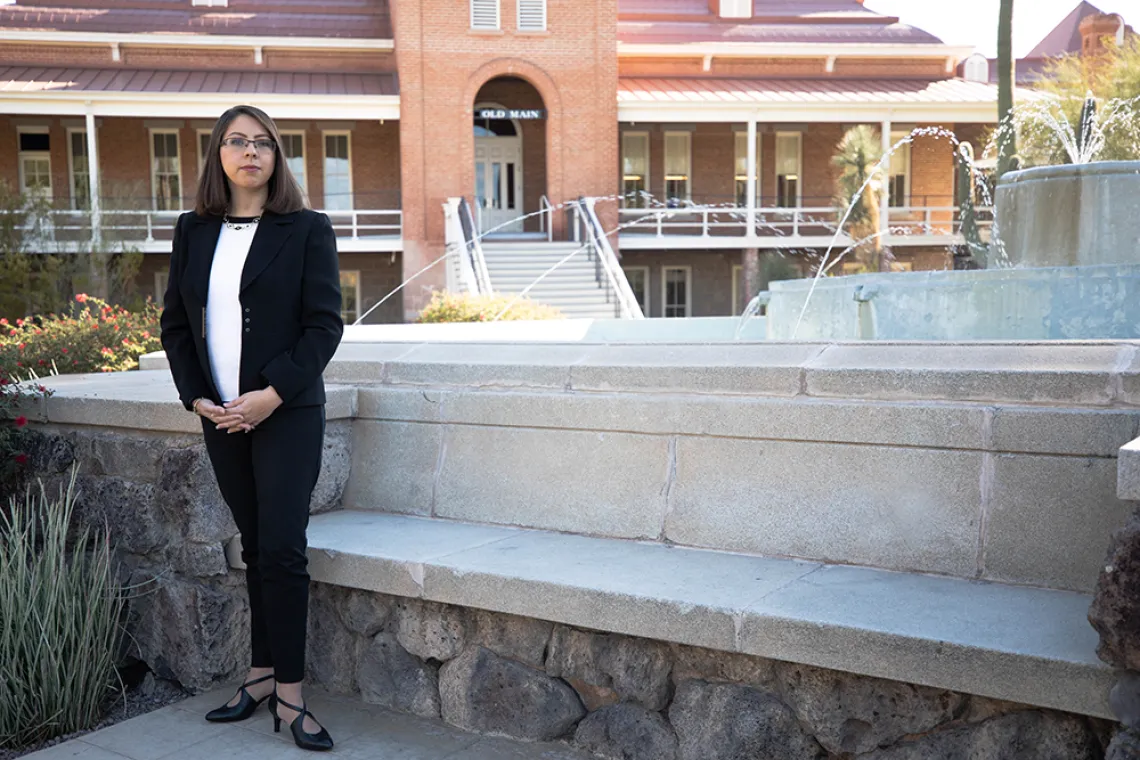With $1.5M Gift, UA Launches Consortium on Gender-Based Violence
A gift from the Chris and Carrie Shumway Foundation will support the UA's Consortium on Gender-Based Violence, a research and resource center that seeks to model and inspire a radical shift in the way people think about and address gender-based violence.

Elise Lopez is the inaugural director of the UA Consortium on Gender-Based Violence.
Nividita Chatani/UA College of Social and Behavioral Sciences
Fueled by a $1.5 million gift from the Chris and Carrie Shumway Foundation, the University of Arizona is launching the Consortium on Gender-Based Violence, which will support comprehensive services, multidimensional programming and research-informed practice.
By identifying and disseminating best practices, the consortium aims to be a national model for understanding and combating gender-based violence, improving support for survivors and eliminating cultural attitudes that re-create cycles of violence.
Gender-based violence is defined as harm inflicted on a person because of their gender. Persons of any gender can be victims of violence, though globally women and girls are far more likely to be harmed by men.
The Shumways were early advocates for and cornerstone investors in the consortium, making their first gift of $500,000 in December 2017. They have since committed an additional $1 million to fund campuswide gender-based violence initiatives and to allow the consortium to further its work.
With a new director at its helm, the consortium will introduce a grant program to incubate innovative solutions and support the new Survivor Advocacy Program offered by the Dean of Students Office. Housed in the UA College of Social and Behavioral Sciences, with UA Student Affairs and Enrollment Management as a key partner, the consortium also will expand its resources as a university "hub" for research and services related to gender-based violence.
Carrie Shumway, who graduated with a B.A. in sociology from the UA in 1993, sits on the boards of several foundations and is a former board member of the Joyful Heart Foundation, which provides services for victims of sexual assault. Her husband, Chris Shumway, is the managing partner of Shumway Capital, a private investment firm.
“Our Foundation believes in the importance of eradicating gender-based violence and is pleased to support this transformative initiative at the University of Arizona,” said Carrie Shumway. “We are looking forward to the university creating a model that can be replicated on college campuses nationwide.”
"When I meet parents and family members of first-year students on move-in day, I tell them how excited we are to have their student here and I promise that we are going to take care of them. The UA becomes our students' home, and we cannot do our primary job educating them, allowing them to develop their minds and characters, and helping them to explore their interests and new relationships if we do not create a safe environment," said UA President Robert C. Robbins. "Violence of any kind, including violence based on a person's gender, has no place on a university campus, and we are all grateful for this generous gift from Carrie and Chris Shumway. The Shumways are giving us the opportunity to fulfill their vision of the UA as a national model for addressing and hopefully eliminating gender-based violence."
"The Shumways obviously care deeply about UA students, but also aspire to effect change well beyond the university. It's exciting to see how their extraordinary generosity is already building momentum on campus for this important work," said John-Paul Roczniak, president and CEO of the UA Foundation.
Elise Lopez is the new director of the consortium. Lopez received her doctorate in public health from the UA and previously served as the assistant director of the Relationship Violence Program in the UA Mel and Enid Zuckerman College of Public Health.
Lopez is an internationally recognized violence scholar, and her work has received national awards. Propelled by public discourse and policy attention, Lopez has focused on campus sexual assault in recent years. She sees the consortium as a mechanism to keep that momentum going.
"We really have an unprecedented opportunity to spark innovation and establish a comprehensive research-to-practice model at the UA for preventing and responding to violence," Lopez said.
Lopez stresses the importance of campus-community collaboration. Her recent community-connected work has included overseeing a national initiative to train liquor servers to recognize and safely respond to sexual aggression.
"Solutions to violence are not confined to campus. Our students are global citizens, and campus and community are inextricably linked," Lopez said.
Monica J. Casper, professor and associate dean for faculty affairs and inclusion in the College of Social and Behavioral Sciences, and Melissa Vito, former senior vice president for student affairs, enrollment management and strategic initiatives for the UA, co-founded the consortium, with initial conversations commencing a few years ago.
"The GBV consortium is important because it represents one of the first of its kind in the country," said Vito, who continues to work with the team. "Among the critical goals of the consortium is for assessment of programs to feed back locally, to our campus, and also nationally and internationally to advance solutions to the problem of gender-based violence."
Casper has been committed to creating an entity like the consortium since she chaired a task force to investigate sexual assault committed on the campus of a different university.
"It became clear to me that a comprehensive approach was needed," Casper said, adding that the consortium is unique in the way it examines all forms of gender-based violence. "We talk about sexual assault but it also addresses domestic violence and anti-trans violence, for example."
"We are deeply grateful to Carrie and Chris for immediately grasping our vision and committing to fund this important venture," Casper said. "As parents of three daughters, they absolutely 'get it.' And I'm thrilled to have their partnership and support."

